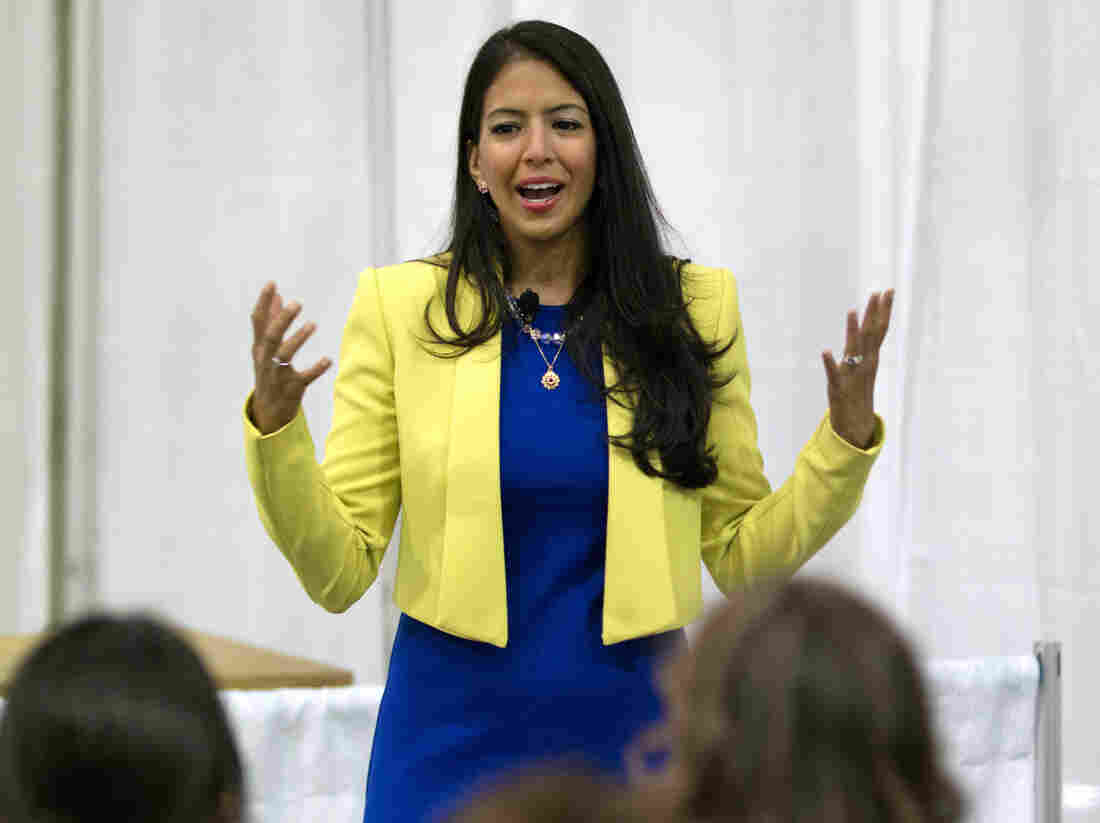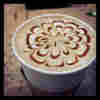
Vani Hari, recognised as the “Foodstuff Babe,” speaks at the Inexperienced Competition in Los Angeles on Sept. 12. Hari has produced a identify for herself by investigating substances in Major Meals products that she deems perhaps destructive. But critics accuse her of stoking unfounded fears.
Jonathan Alcorn/Bloomberg through Getty Pictures
hide caption
toggle caption
Jonathan Alcorn/Bloomberg by means of Getty Pictures

Vani Hari, recognized as the “Foods Babe,” speaks at the Environmentally friendly Festival in Los Angeles on Sept. 12. Hari has created a title for herself by investigating ingredients in Huge Foods solutions that she deems possibly damaging. But critics accuse her of stoking unfounded fears.
Jonathan Alcorn/Bloomberg via Getty Illustrations or photos
In an age when consumers have become increasingly suspicious of processed food stuff, the Internet has turn out to be a strong system for activists who want to keep Significant Food stuff accountable.
1 of the best-profile of these new food items crusaders is Vani Hari, much better acknowledged by her on the net moniker, Food items Babe. Amid her victories: a petition that nudged Kraft to drop the artificial orange colour from its mac and cheese, and a different one that aided get Subway to do away with the widespread bread additive azodicarbonamide — which Hari pointed out was also applied in making yoga mats.
To followers on her web page and on social media, who are acknowledged as the Meals Babe Military, Hari is a hero. And with a guide and Tv improvement deal in the performs, her system is about to get a great deal larger.
But as her profile grows, so much too do the criticisms of her strategy. Detractors, a lot of of them teachers, say she stokes unfounded fears about what is in our food stuff to garner publicity. Steve Novella, a Yale neuroscientist and notable pseudoscience warrior, among other folks, has dubbed Hari the “Jenny McCarthy of foods” soon after the movie star recognised for championing completely debunked promises that vaccines lead to autism.

Hari is a self-styled customer advocate and adviser on healthful taking in. Her internet site, FoodBabe.com, features recipes, recommendations for nutritious eating when touring, and, for $17.99 a month, “feeding on guides” that involve recipes, meal calendars and procuring lists. But she’s most effective-acknowledged for her foodstuff investigations, regularly shared on social media — posts in which she flags what she deems to be questionable substances.
Choose, for instance, Hari’s campaign urging beer-makers to expose the substances in their brews. Amongst the substances that anxious Hari was propylene glycol, a chemical utilised in antifreeze. But, as most cancers surgeon and blogger David Gorski writes, the solution made use of in some beers to stabilize foam is truly propylene glycol alginate — which is derived from kelp. “It is not the exact chemical as propylene glycol, not even near. It is not antifreeze,” he wrote.
Another beer ingredient that received Hari up in arms? Isinglass, or dried fish swim bladders, which may audio, properly, fishy, but has been utilised to clarify beers for properly over a century. This sort of mix-ups prompted historian Maureen Ogle, the writer of Bold Brew: The Tale of American Beer, to dissect Hari’s statements, stage by level, in a put up on her website titled “What is actually In YOUR Beer? Or, The Dangers of Dumbassery.”

Hari’s method capitalizes on rising client distrust of both equally Huge Food stuff providers and their unfamiliar, industrial-sounding components, and of regulators’ capability to oversee them correctly. Some of these chemicals and additives may perhaps in fact be questionable, but food researchers would argue that practically all are safe and sound. So why do food stuff corporations react to her requires, if they have practically nothing to hide?
Because, Gorski writes, “companies dwell and die by general public notion. It truly is much less complicated to give a blackmailer like Hari what she desires than to consider to resist or to counter her propaganda by educating the community.”
Critics be aware that Hari lacks credentials in nutrition or meals science she’s a previous marketing consultant who examined computer system science. Hari declined to be interviewed for this story by her publicist, she told NPR she isn’t talking to media till her new e-book is released in February. But when the Charlotte Observer requested her about such criticisms, Hari answered, “I have under no circumstances claimed to be a nutritionist. I’m an investigator.”
But that lack of teaching frequently sales opportunities her to misinterpret peer-reviewed research and technological aspects about foods chemistry, nourishment and wellness, says Kevin Folta, a professor of horticultural sciences at the University of Florida and vocal on line critic of Hari. “She genuinely conflates the science,” he tells The Salt.
“If everything, she’s developed extra confusion about foodstuff, more confusion about the job of chemical substances and additives,” Folta suggests.
Far more not too long ago, as we have noted, Hari’s assaults on the absence of pumpkin in Starbucks’ Pumpkin Spice lattes prompted the Institute of Food stuff Technologists to launch a video clip detailing the chemical compounds that replicate that squash taste in a cup of Joe.
“What she does is exploit the scientific ignorance and panic of her followers,” claims Kavin Senapathy, an anti-pseudoscience blogger who regularly problems the assertions in Hari’s posts. “And most of us are in arrangement that we just are unable to take that.”
Senapathy and other on the web critics, employing parody names like Science Babe, Chow Babe and Meals Hunk, have taken to Twitter and Fb in an structured effort to have interaction with Hari’s followers and counter her scientific promises.
So why not only ignore Hari? Mainly because her reach is rising: Final thirty day period her op-ed was featured in The New York Times’ Area for Discussion area. In October, Experience Existence magazine, a wellness and exercise publication, showcased her on its deal with. That decision prompted critics to bombard the magazine’s Amazon page with solitary-star testimonials for putting “an uneducated fearmonger” on its go over.
And this drop, Hari tackled the College of Florida as section of a lecture series for freshmen on “The Superior Food Revolution.” That discuss prompted Folta to write a scathing weblog put up about her go to in which he accused her of being “fearful of science and mental engagement.”
He was indignant that her speak failed to incorporate a dilemma and reply interval in which he could obstacle her on some of her scientific assertions. “When you carry in a self-appointed specialist, a celeb far more than a scientific figure, it does have the effect of undoing the science we are trying to instill in our learners,” Folta explained to me.
Eventually, Folta claims, he thinks Hari’s heart is in the ideal location. “She does look to arrive from an honest intention of wanting folks to feel about excellent foods choices and health.” But, he says, “it can be a issue of science.”
Other critics are a lot less generous in their assessment, noting that Hari just isn’t just raising the alarm about foodstuff additives. Through affiliated marketing and advertising partnerships, she is also building cash by referring her web-site visitors to natural and non-GMO food brand names, as Advert Age has described. In truth, the Foods Babe model, a registered LLC, has turn into a total-time occupation for Hari, who also earns expenses from talking appearances.
“Regrettably, the World-wide-web is cluttered with men and women who really have no concept what they are talking about giving suggestions as if it were being authoritative, and typically that advice is coloured by both an ideological agenda or a commercial fascination,” Yale’s Novella writes on his blog site. “The Foodstuff Babe is now the poster youngster for this phenomenon.”
Hari has brushed off this sort of inquiries about her motivations and scientific proficiency. “I know that I am doing the appropriate thing,” she told the Observer. “I’m attempting to support folks understand matters that no one else has spoken out about.”
But the message of Hari’s campaigns boils down to “this harmful magic formula factor they are putting in my food is building me [sick],” suggests John Coupland, a food items scientist at Penn State, in an email to The Salt.
“I personally feel this is mostly a distraction from a lot more true problems” about the food system, states Coupland. Troubles, he says, like advertising aimed at young children, the environmental impacts of foodstuff manufacturing, food stuff squander and starvation.





More Stories
Getting Your Emotional Support Animal Ready for Travel
2022/2023 Winter School Break Camps
Identifying Equitable Intervention – Language Magazine